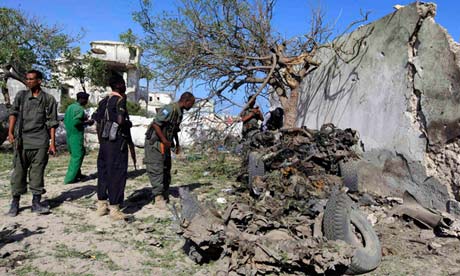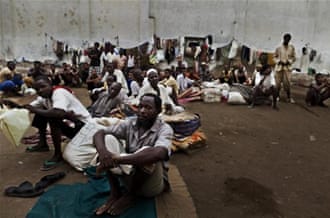Please feel free to use this information, including videos, images and commentary, in your coverage of current developments in Syria. If you have any questions, please don’t hesitate to contact me at this email: ammar.abdulhamid@gmail.com. The Digest will also be posted on Blogger and Facebook.
Syria Über Assad!
Syrian Revolution Digest – March 3, 2013
Each time he speaks he makes it clear to all that he could never be part of any solution and that he is indeed an impediment that needs to be removed. People like Assad are never more wrong and dangerous than when they are confident. And Assad was confident during his interview with the Times. Too confident. The end is nigh. His, and, for a while, Syria’s. For, irrespective of both Sunni and Alawite beliefs, Assad can never rise again, but Syria… Syria has always been a phoenix: she does not die, she transforms.
Sunday March 3, 2013
Today’s Death Toll: 154martyrs, including 5 children 12 women, and 2 under torture: 44 martyrs were reported in Damascus and suburbs, 24 in Daraa, 23 in Aleppo,18 in Homs, 11 in Hama, 11 in Lattakia, 11 in Idlib, 10 in Deir Ezzor and 2 martyrs in Raqqa (LCCs).
Points of Random Shelling: 370 points: 3 areas were shelled with Scud missiles, and 8 points were shelled with MiG warplanes, cluster bombs strikes were recorded in 3 points, artillery shelling was recorded in 151 points, either mortar shelling was recorded in 110 areas and missile strikes were reported in 95 points in different parts of Syria (LCCs).
Clashes: 120. Successful operations include liberation of the Police Academy in Khan Al-Assal in North Aleppo, shooting down a helicopter in Latakia suburbs, and taking control of the Maysaloon-Abassid Square Road in Damascus. In Raqqa, FSA rebels also gained control over Safian oil field and neighboring territories. In Homs, FSA fighters managed to repel an attempt by pro-regime militias to storm rebel strongholds in Khaldiyeh, Bab Houd, and other Old Homs neighborhoods. In Daraa, rebels repelled an attack on Basr Al-Harir. Finally, rebels in Daraya, Jobar and Eastern Ghoutah region in Damascus Suburbs repelled renewed regime attacks on their strongholds (LCCs).
News
Opposition leader visits north Syria as rebels seize army post The capture of the police academy at Khan al-Asal, used by Assad’s forces as an artillery base to support troops still holding around 40 percent of the northern city, came after days of fighting in which rebels killed 150 soldiers, while sustaining heavy casualties, they said. In an attempt to consolidate those gains on the ground and strengthen links between Assad’s military and civilian foes, Alkhatib crossed into northern Syria from neighboring Turkey and toured the towns of Jarablus and Minbij. Earlier he attended a meeting of 220 rebel commanders and opposition campaigners in the Turkish city of Gaziantep to elect an administration for Aleppo province, home to 6 million people.
Miles From Home, Syrians Vote In Free Elections The entire election organization moved to southern Turkey over a weekend. An army of activists arrived to set up a media center. A new FM radio station opened to cover the elections through transmitters that reach Aleppo. In an unfurnished apartment, an election center is already bustling. The apartment’s bare rooms look more like a college dorm with floor mattresses, plastic chairs and desks. Computers and cameras are everywhere.
Syria’s Assad is ‘delusional’ says William Hague UK foreign secretary hits back at Bashar al-Assad after Syrian leader accuses Britain of resuming a ‘bullying’ colonial role
Shi’ite fighters rally to defend Damascus shrine The presence of Shi’ite combatants from neighboring states – confirmed by sources in Iraq and Syria and highlighted in videos glorifying their mission – underlines how Syria’s conflict is inflaming sectarian feelings in the region. Abu al-Fadl al-Abbas brigade, named after a seventh century martyr son of Imam Ali who is considered the father of Shi’ite Islam, was formed several months ago and fights mainly around the shrine of Sayyida Zeinab on the southern outskirts of the Syrian capital, a source close to the brigade said.
Syria rebels ‘capture most of police academy’ More than 200 troops and rebels reported killed in fighting for one of last regime bastions in western Aleppo province.
UK: Charities urge BBC to launch emergency appeal for victims of Syria’s war Corporation fears lack of public sympathy for plight of millions may hurt fundraising efforts.
Special Reports
Worldview: In Kerry’s ‘big’ Syria offer, a proposal woefully lacking
Those two words sum up the farcical “new” policy toward Syria that Secretary of State John Kerry announced at a Rome meeting with Syrian opposition leaders. In what was ballyhooed as a major breakthrough, the United States will, for the first time, provide aid to the armed Syrian opposition. So what are we giving to help Syrian rebels confront the missiles and bombs that have killed tens of thousands of civilians? Not desperately needed antitank or antiaircraft weapons, but medical aid and MREs, those ready-to-eat-meals used as field rations for American soldiers. Biscuits and Band-Aids to combat Bashar al-Assad’s Scuds.
Expert: Obama ‘uninterested’ in Syria intervention
In response to a question by The Jerusalem Post, asking what the policy of the US should be in Syria, Rabinovich said, “Sneakers on the ground, not boots on the ground.” He explained this by saying US President Barack Obama is not interested in a full-scale military operation and “his new defense secretary is not interested” in one either. He said that by sneakers, he meant special forces combined with supporting those in the opposition that most closely reflect US values, and not the Islamists.
My new paper, prepared for a briefing in Washington, D.C. that took place on January 15, 2013, is now out and is titled “Syria 2013: Rise of the Warlords.” It should be read in conjunction with my previous briefing “The Shredded Tapestry,” and my recent essay “The Creation of an Unbridgeable Divide.”
Quickly Noted
Historically speaking, Bashar Al-Assad’s confident tones have always reflected the weakness of western policies vis-à-vis his regime. So long as the West dithers, Assad, backed by Iran and Russia, will kill with impunity, while lecturing the world, and his victims, on morality and patriotism.
Robert Fisk gets it wrong, again: It’s not the West that is drawn maps this time around, it’s the Assad regime, Iran and Russia. Instead of watching what pundits are saying on Western media, Fisk should watch the events unfolding on the ground, the patterns of ethnic cleansing, Hezbollah’s involvement, the rising sectarian aspect of the entire unfolding. Robert Fisk’s orientalism is no less pronounced than that of Henri Lammens.
Video Highlights
Opposition leader Sheikh Moaz Alkhatib pays a visit to the towns of Jarablos and Manbij in North Aleppo http://youtu.be/LKGdLOD1De8 Singing with the rebels http://youtu.be/yUDv0KWSwJg Shortly after Sheikh Alkhatib left Manbij, a Scud paid her a visit http://youtu.be/eYEQX7tI9EI
Rebels confirm the liberation of the Police Academy in Khan Al-Assal, North Aleppo http://youtu.be/fT8BSq1UgX4 Scenes from after the liberation http://youtu.be/II-5Zj2JY-s , http://youtu.be/A2DTAppexSU , http://youtu.be/ZMsfkjlwHH8 Rebels used their own tanks in the battle http://youtu.be/KPnO84V7IGs Scenes from the final clashes http://youtu.be/_TT566FweFM
Another leaked video showing the launch of a Scud missile http://youtu.be/F_uFvU3SKs8 Two Scuds fired simultaneously http://youtu.be/M0ih0HezdT0 A scud missile falls without exploding on the town of Al-Muwailih in Deir Ezzor Province http://youtu.be/gW1oVnCdoGo
Rebels wrest control of another checkpoint on the outskirts of Raqqah City http://youtu.be/fpkIAZ85-sw A tanks confiscated by rebels after taking control of the Central Prison in Raqqah http://youtu.be/WbPlMRpBxng
The battle for control of Old Homs neighborhoods intensify http://youtu.be/dbQv7zINUNg So does the bombing campaign http://youtu.be/PHZTcheA0W8 , http://youtu.be/VTiN-RNh08I The red circle in the map below point out roughly the besieged rebel strongholds. It’s been almost 18 months since the siege began.
The last clip shot by activist Jameel Omayrah in Jobar Neighborhood, Damascus, before his martyrdom http://youtu.be/4NITwK6Ae78 The nearby town of Douma gets pounded http://youtu.be/bEVBPuVijoo Searching for the dead and wounded http://youtu.be/SMyqeJOt6do
Leaders of the Free Syrians Army, including Col. Riyad Al-Ass’aad and his deputies pay a visit to the liberated village of Burj Al-Kassab in the Turkmen Mountain in North Latakia http://youtu.be/Wz3BCbdr4Gs Talking with the locals http://youtu.be/zohLcdt5mZc Making the rounds http://youtu.be/dzw7X57U_qI Rebels in Latakia treat their wounded from a recent battle http://youtu.be/ANLYaSU4Utw

